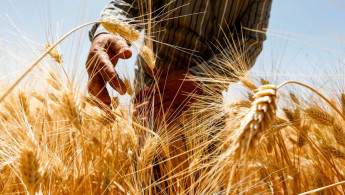European wheat prices hit record high after Ukraine invasion
The price of wheat smashed its previous record high in European trading on Thursday as Russia invaded Ukraine, putting a question mark on the future of exports from two of the world's biggest producers of the key commodity.
Wheat soared to 344 euros ($384) a tonne, far above its previous record of 313.5 euros recorded late last year, said Edward de Saint-Denis of the brokerage firm Plantureux & Associates.
It later fell back to around 320 euros a tonne. The price of corn meanwhile shot up to 304 euros a tonne.
After weeks of warnings from the United States and other powers, Russian President Vladimir Putin ordered a wide-ranging offensive into its neighbour, sparking fury from other world leaders and vows to ramp up sanctions on Moscowhttps://t.co/9lxXDlOHCe
— The New Arab (@The_NewArab) February 24, 2022
Agricultural commodities are usually much less volatile than stocks or oil, but have recently seen spectacular spikes and drops provoked by Russia's looming invasion of Ukraine.
The stakes are especially high for wheat, with Russia being the world's top exporter and Ukraine the fourth, according to estimates by the US Department of Agriculture (USDA).
The consequences for agricultural markets of Russia's invasion of Ukraine on Thursday, which provoked threats of broad sanctions against Moscow from the West, are still difficult to predict.
"It is totally unprecedented," said Sebastien Poncelet, an analyst with the French consultancy Agritel.
"When we see that there are explosions in Odessa, which is the main Ukrainian port, we must assume there will not be much grain loaded there today," he said.
When Russia annexed the Crimea peninsula in 2014, then backed pro-Moscow separatists in Ukraine's east, prices rose by 15-20 percent, before falling back after four to five months.
"The fighting was essentially confined to Donbas, which is not a big agricultural region, and the crisis remained focused on Crimea," Poncelet said.
"What we are seeing today is on a completely different scale."
In Italy, which imports a majority of its wheat and corn, the Coldiretti agricultural association sounded the alarm on Thursday.
"The war is aggravating the problems of the national agricultural sector, which is already suffering from the effects of price volatility," Coldiretti president Ettore Prandini said in a statement.





 Follow the Middle East's top stories in English at The New Arab on Google News
Follow the Middle East's top stories in English at The New Arab on Google News


